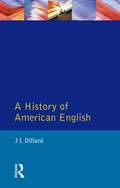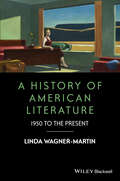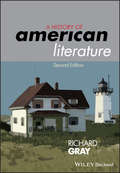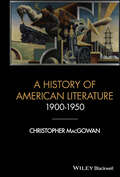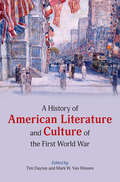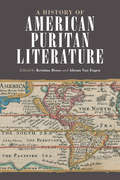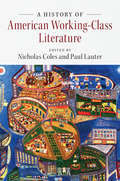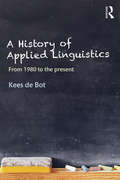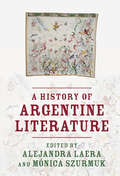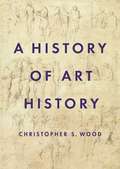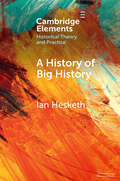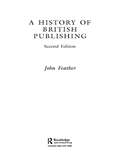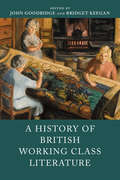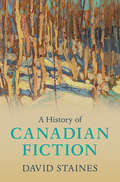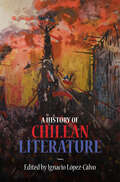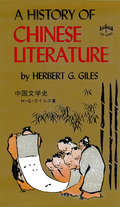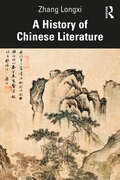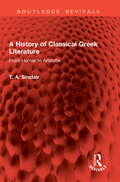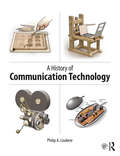- Table View
- List View
A History of American English (Longman Linguistics Library)
by J. L. DillardThis impressive volume provides a chronological, narrative account of the development of American English from its earliest origins to the present day.
A History of American Literature
by Linda Wagner-MartinThe History of American Literature from 1950 to the Present offers a comprehensive analysis of the wide range of literary works that extends into the 21st centuryCovers drama, poetry, fiction, non-fiction, memoirs, science fiction, and detective novelsFeatures discussion of American works within the context of such 21st-century issues as globalization, medicine, gender, education, and other topics
A History of American Literature
by Richard GrayUpdated throughout and with much new material, A History of American Literature, Second Edition, is the most up-to-date and comprehensive survey available of the myriad forms of American Literature from pre-Columbian times to the present. The most comprehensive and up-to-date history of American literature available today. Covers fiction, poetry, drama, and non-fiction, as well as other forms of literature including folktale, spirituals, the detective story, the thriller, and science fiction. Explores the plural character of American literature, including the contributions made by African American, Native American, Hispanic and Asian American writers. Considers how our understanding of American literature has changed over the past?thirty years. Situates American literature in the contexts of American history, politics and society. Offers an invaluable introduction to American literature for students at all levels, academic and general readers
A History of American Literature
by Richard GrayUpdated throughout and with much new material, A History of American Literature, Second Edition, is the most up-to-date and comprehensive survey available of the myriad forms of American Literature from pre-Columbian times to the present. The most comprehensive and up-to-date history of American literature available today Covers fiction, poetry, drama, and non-fiction, as well as other forms of literature including folktale, spirituals, the detective story, the thriller, and science fiction Explores the plural character of American literature, including the contributions made by African American, Native American, Hispanic and Asian American writers Considers how our understanding of American literature has changed over the past?thirty years Situates American literature in the contexts of American history, politics and society Offers an invaluable introduction to American literature for students at all levels, academic and general readers
A History of American Literature 1900 - 1950 (Wiley-Blackwell Histories of American Literature)
by Christopher MacGowanA look at the first five decades of 20th century American literature, covering a wide range of literary works, figures, and influences A History of American Literature 1900-1950 is a current and well-balanced account of the main literary figures, connections, and ideas that characterized the first half of the twentieth century. In this readable, highly informative book, the author explores significant developments in American drama, fiction, and poetry, and discusses how the literature of the period influenced, and was influenced by, cultural trends in both the United States and abroad. Considering works produced during America’s rise to prominence on the world stage from both regional and international perspectives, MacGowan provides readers with keen insights into the literature of the period in relation to America’s transition from an agrarian nation to an industrial power, the racial and economic discrimination of Black and Native American populations, the greater financial and social independence of women, the economic boom of the 1920s, the Depression of the 1930s, the impact of world wars, massive immigration, political and ideological clashes, and more. Encompassing five decades of literary and cultural diversity in one volume, A History of American Literature 1900-1950: Covers American theater, poetry, fiction, non-fiction, memoirs, magazines and literary publications, and popular media Discusses the ways writers dramatized the immense social, economic, cultural, and political changes in America throughout the first half of the twentieth century Explores themes and influences of Modernist poets, expatriate novelists, and literary publications founded by women and African-Americans Features the work of Black writers, Native Americans, Asian Americans, and Jewish AmericansA History of American Literature 1900-1950 is essential reading for all students in upper-level American literature courses as well as general readers looking to better understand the literary tradition of the United States.
A History of American Literature and Culture of the First World War
by Tim Dayton Van Wienen, Mark W.In the years of and around the First World War, American poets, fiction writers, and dramatists came to the forefront of the international movement we call Modernism. At the same time a vast amount of non- and anti-Modernist culture was produced, mostly supporting, but also critical of, the US war effort. A History of American Literature and Culture of the First World War explores this fraught cultural moment, teasing out the multiple and intricate relationships between an insurgent Modernism, a still-powerful traditional culture, and a variety of cultural and social forces that interacted with and influenced them. Including genre studies, focused analyses of important wartime movements and groups, and broad historical assessments of the significance of the war as prosecuted by the United States on the world stage, this book presents original essays defining the state of scholarship on the American culture of the First World War.
A History of American Literature: 1950 to the Present (Wiley-Blackwell Histories of American Literature)
by Linda Wagner-MartinThe History of American Literature from 1950 to the Present offers a comprehensive analysis of the wide range of literary works that extends into the 21st century Covers drama, poetry, fiction, non-fiction, memoirs, science fiction, and detective novels Features discussion of American works within the context of such 21st-century issues as globalization, medicine, gender, education, and other topics
A History of American Puritan Literature
by Kristina Bross Abram Van EngenFor generations, scholars have imagined American puritans as religious enthusiasts, fleeing persecution, finding refuge in Massachusetts, and founding “America.” The puritans have been read as a product of New England and the origin of American exceptionalism. This History challenges the usual understanding of American puritans, offering new ways of reading their history and their literary culture. Together, an international team of authors make clear that puritan America cannot be thought of apart from Native America, and that its literature is also grounded in Britain, Europe, North America, the Caribbean, and networks that spanned the globe. Each chapter focuses on a single place, method, idea, or context to read familiar texts anew and to introduce forgotten or neglected voices and writings. A History of American Puritan Literature is a collaborative effort to create not a singular literary history, but a series of interlocked new histories of American puritan literature.
A History of American Working-Class Literature
by Paul Lauter Nicholas ColesA History of American Working-Class Literature sheds light not only on the lived experience of class but the enormously varied creativity of working-class people throughout the history of what is now the United States. By charting a chronology of working-class experience, as the conditions of work have changed over time, this volume shows how the practice of organizing, economic competition, place, and time shape opportunity and desire. The subjects range from transportation narratives and slave songs to the literature of deindustrialization and globalization. Among the literary forms discussed are memoir, journalism, film, drama, poetry, speeches, fiction, and song. Essays focus on plantation, prison, factory, and farm, as well as on labor unions, workers' theaters, and innovative publishing ventures. Chapters spotlight the intersections of class with race, gender, and place. The variety, depth, and many provocations of this History are certain to enrich the study and teaching of American literature.
A History of Applied Linguistics: From 1980 to the present
by Kees de BotThis book provides one perspective on how Applied Linguistics has been defined and how the field of Applied Linguistics has developed over the last 30 years. The author addresses themes like why formal linguistic theories lost so much ground and how the interest in more socially oriented approaches grew? He also addresses the impact of Applied Linguistics on language teaching. Adopting a theme-based approach, the structure of this book is largely defined by the topics covered in interviews with 40 leading international figures selected by the author including Rod Ellis, Diane Larsen-Freeman, Susan Gass, Henry Widdowson, Suresh Canagarajah and Claire Kramsch. These data are supplemented by questionnaires from a further fifty applied linguists, also selected by the author. This will be of interest to anyone studying or researching Applied Linguistics and will also be relevant to those in the related area of English Language Teaching.
A History of Argentine Literature
by Mónica Szurmuk Alejandra LaeraArgentine Literature continues to figure prominently in academic programs in the English-speaking world, and it has an increasing presence in English translation in international prizes and trade journals. A History of Argentine Literature proposes a major reimagining of Argentine literature attentive to production in indigenous and migration languages and to current debates in Literary Studies. Panoramic in scope and incisive in its in-depth studies of authors, works, and theoretical problems, this volume builds on available scholarship on canonical works but opens up the field to include a more diverse rendering as well as engaging with the full spectrum of textual interventions from travel writing to drama, from popular 'gauchesca' to celebrated avant guard works Working at the crossroads of disciplines, languages and critical traditions, this book accounts for the wealth of Argentine cultural production and maps the rich, diverse and often overlooked history of Argentine literature.
A History of Art History
by Christopher WoodAn authoritative history of art history from its medieval origins to its modern predicamentsIn this wide-ranging and authoritative book, the first of its kind in English, Christopher Wood tracks the evolution of the historical study of art from the late middle ages through the rise of the modern scholarly discipline of art history. Synthesizing and assessing a vast array of writings, episodes, and personalities, this original and accessible account of the development of art-historical thinking will appeal to readers both inside and outside the discipline.The book shows that the pioneering chroniclers of the Italian Renaissance—Lorenzo Ghiberti and Giorgio Vasari—measured every epoch against fixed standards of quality. Only in the Romantic era did art historians discover the virtues of medieval art, anticipating the relativism of the later nineteenth century, when art history learned to admire the art of all societies and to value every work as an index of its times. The major art historians of the modern era, however—Jacob Burckhardt, Aby Warburg, Heinrich Wölfflin, Erwin Panofsky, Meyer Schapiro, and Ernst Gombrich—struggled to adapt their work to the rupture of artistic modernism, leading to the current predicaments of the discipline.Combining erudition with clarity, this book makes a landmark contribution to the understanding of art history.
A History of Big History (Elements in Historical Theory and Practice)
by Ian HeskethBig History is a seemingly novel approach that seeks to situate human history within a grand cosmic story of life. It claims to do so by uniting the historical sciences in order to construct a linear and accurate timeline of 'threshold moments' beginning with the Big Bang and ending with the present and future development of humanity itself. As well as examining the theory and practice of Big History, this Element considers Big History alongside previous largescale attempts to unite human and natural history, and includes comparative discussions of the practices of chronology, universal history, and the evolutionary epic.
A History of British Publishing
by John FeatherThoroughly revised, restructured and updated, A History of British Publishing covers six centuries of publishing in Britain from before the invention of the printing press, to the electronic era of today. John Feather places Britain and her industries in an international marketplace and examines just how ‘British’, British publishing really is. Considering not only the publishing industry itself, but also the areas affecting, and affected by it, Feather traces the history of publishing books in Britain and examines: education politics technology law religion custom class finance, production and distribution the onslaught of global corporations. Specifically designed for publishing and book history courses, this is the only book to give an overall history of British publishing, and will be an invaluable resource for all students of this fascinating subject.
A History of British Working Class Literature
by John Goodridge Bridget KeeganA History of British Working-Class Literature examines the rich contributions of working-class writers in Great Britain from 1700 to the present. Since the early eighteenth century the phenomenon of working-class writing has been recognised, but almost invariably co-opted in some ultimately distorting manner, whether as examples of 'natural genius'; a Victorian self-improvement ethic; or as an aspect of the heroic workers of nineteenth- and twentieth-century radical culture. The present work contrastingly applies a wide variety of interpretive approaches to this literature. Essays on more familiar topics, such as the 'agrarian idyll' of John Clare, are mixed with entirely new areas in the field like working-class women's 'life-narratives'. This authoritative and comprehensive History explores a wide range of genres such as travel writing, the verse-epistle, the elegy and novels, while covering aspects of Welsh, Scottish, Ulster/Irish culture and transatlantic perspectives.
A History of California Literature
by Blake AllmendingerBlake Allmendinger's A History of California Literature surveys the paradoxical image of the Golden State as a site of dreams and disenchantment, formidable beginnings and ruinous ends. This history encompasses the prismatic nature of California by exploring a variety of historical periods, literary genres, and cultural movements affecting the state's development, from the colonial era to the twenty-first century. Written by a host of leading historians and literary critics, this book offers readers insight into the tensions and contradictions that have shaped the literary landscape of California and also American literature generally.
A History of Canadian Fiction
by David StainesA History of Canadian Fiction is the first one-volume history to chart its development from earliest times to the present day. Recounting the struggles and the glories of this burgeoning area of investigation, it explains Canada's literary growth alongside its remarkable history. Highlighting the people who have shaped and are shaping Canadian literary culture, the book examines such major figures as Mavis Gallant, Mordecai Richler, Alice Munro, Margaret Atwood, Michael Ondaatje, and Thomas King, concluding with young authors of today whose major successes reflect their indebtedness to their Canadian forbearers.
A History of Chilean Literature
by Ignacio López-CalvoThis book covers the full range and diversity of Chilean literature from the times of the Spanish conquest to the present. By emphasizing transnational, hemispheric, and global approaches to Chilean literature, it reflects the relevance of themes such as neoliberalism, migration and exile, as well as subfields like ethnic studies, and gender and sexuality studies. It showcases the diversity of Chilean literature throughout all periods, regions, ethnocultural groups and social classes, all the while foregrounding its regional variations. Unlike previous literary histories, it maps a rich heterogeneity by including works by Chileans of indigenous, African, Jewish, Arab, Asian, and Croatian ancestries, as well as studies of literature by LGTBQ authors and Chilean Americans. Ambitious and authoritative, this book is essential reading for scholars of Chilean Literature, Latin American Literature, the Global South, and World Literature.
A History of Chinese Literature
by Herbert G. GilesA History of Chinese Literature is THE classic introduction to Chinese literature, which has given to the world exquisite poetry and such classics as Monkey, The Analects of Confucius, the works of Chuang Tzu, and other writings over a time span of 2,500 or more years.<P><P>Author, Professor Giles, a legendary scholar of Chinese, was best known for the Wade-Giles romanization system. In this book he considered all forms of Chinese literature including: prose, poetry, the novel, the short story, drama, and scientific writing. The material is organized chronologically into eight books which are in turn divided into subject chapters. The arrival of Buddhism to China, the invention of printing, and other significant events are admirably outlined. Whoever reads this excellent introduction will be hungry for more of the literary products of China.A History of Chinese Literature provides us with a capsule guide to 2,500 years of Chinese culture. Remote as ancient literature may seem to Chinese manners today, the traditional literature does in fact provide a key to modern China and to Chinese communism. This populous nation, which represents the world's oldest living civilization, is in reality still close to its own past philosophies and ideals.
A History of Chinese Literature
by Zhang LongxiZhang Longxi, an internationally renowned scholar of Chinese and comparative literature, is your guide to the three-millennia-long history of Chinese literature from the remote antiquity of oracle bones to contemporary works. Professor Zhang charts the development of the major literary forms in Chinese, including poetry, prose, song lyrics, and plays, and introduces the most famous poets and writers and their representative texts. Taking a period-based approach through the major dynasties, he places these forms, texts, and authors within their historical contexts and tells the fascinating story of Chinese literature with copious examples in English translation. He writes in a clear and accessible style and assumes no prior knowledge of Chinese history or Chinese literature. This book is an ideal introduction for students and the general readers who want to get a broad but thorough overview of Chinese literature in all its richness and diversity.
A History of Chinese Literature
by Zhang LongxiZhang Longxi, an internationally renowned scholar of Chinese and comparative literature, is your guide to the three-millennia-long history of Chinese literature from the remote antiquity of oracle bones to contemporary works. Professor Zhang charts the development of the major literary forms in Chinese, including poetry, prose, song lyrics, and plays, and introduces the most famous poets and writers and their representative texts. Taking a period-based approach through the major dynasties, he places these forms, texts, and authors within their historical contexts and tells the fascinating story of Chinese literature with copious examples in English translation. He writes in a clear and accessible style and assumes no prior knowledge of Chinese history or Chinese literature. This book is an ideal introduction for students and the general readers who want to get a broad but thorough overview of Chinese literature in all its richness and diversity.
A History of Classical Greek Literature: From Homer to Aristotle (Routledge Revivals)
by T. A. SinclairFirst Published in 1934, this book gives a general survey of the history of classical Greek literature from Homer to Aristotle. It discusses important themes like Homeric criticism and the Homeric question; elegiac poetry; lyric poetry; myth and history in verse; Heraclitus and philosophy in prose; the scientific study of history; origins of tragedy; origins of comedy; changes in the fourth century; and Aristotle and the end of the classical period. This is a must read for students of Greek literature and history of classical literature.
A History of Colombian Literature
by Raymond Leslie WilliamsIn recent decades, the international recognition of Nobel Laureate Gabriel García Márquez has placed Colombian writing on the global literary map. A History of Colombian Literature explores the genealogy of Colombian poetry and prose from the colonial period to the present day. Beginning with a comprehensive introduction that charts the development of a national literary tradition, this History includes extensive essays that illuminate the cultural and political intricacies of Colombian literature. Organized thematically, these essays survey the multilayered verse and fiction of such diverse writers as José Eustacio Rivera, Tomás Carrasquilla, Alvaro Mutis, and Darío Jaramillo Agudelo. Written by a host of leading scholars, this History also devotes special attention to the lasting significance of colonialism and multiculturalism in Colombian literature. This book is of pivotal importance to the development of Colombian writing and will serve as an invaluable reference for specialists and students alike.
A History of Communication Technology
by Philip LoubereThis book is a comprehensive illustrated account of the technologies and inventions in mass communication that have accelerated the advancement of human culture and society. A History of Communication Technology covers a timeline in the history of mass communication that begins with human prehistory and extends all the way to the current digital age. Using rich, full-color graphics and diagrams, the book details the workings of various mass communication inventions, from paper-making, printing presses, photography, radio, TV, film, and video, to computers, digital devices, and the Internet. Readers are given insightful narratives on the social impact of these technologies, brief historical accounts of the inventors, and sidebars on the related technologies that enabled these inventions. This book is ideal for students in introductory mass communication, visual communication, and history of media courses, offering a highly approachable, graphic-oriented approach to the history of communication technologies.
